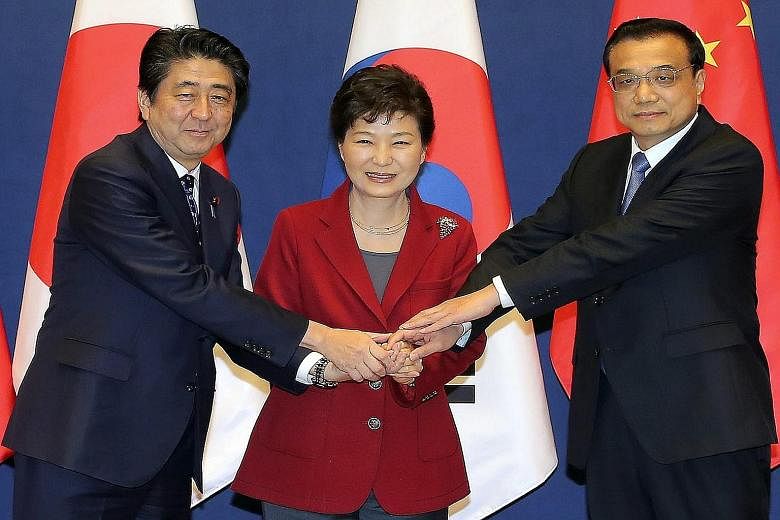Setting strained relations aside, the leaders of South Korea, Japan and China called for greater trilateral cooperation in trade and security yesterday and agreed to face up to history, in a big step towards normalising ties at their first meeting in more than three years.
South Korean President Park Geun Hye, Chinese Premier Li Keqiang and Japanese Prime Minister Shinzo Abe also urged more efforts in resuming six-party talks aimed at denuclearising North Korea and promoting peace in North-east Asia.
Trilateral cooperation has been "completely restored" during this summit and the three leaders will continue to meet every year, said a joint statement issued after their 90-minute Seoul summit that addressed issues ranging from economic integration to financial stability to nuclear security.
"We reached the common recognition that the situation in which economic interdependence and political/security tensions coexist must be overcome in order to build permanent peace, stability and co-prosperity in the region, and to continue to develop trilateral cooperation unwaveringly," the leaders said in the statement.
"In the spirit of facing history squarely and advancing towards the future, we agreed that the three countries should address related issues properly and to work together to improve bilateral relations and to strengthen trilateral cooperation," it added.
The trilateral summit, which began in 2008, stalled in 2012 due to historical and territorial disputes.
Though there was no major breakthrough yesterday, the mere resumption of talks is a sign of willingness to mend frayed ties.
The three leaders also agreed to work towards concluding a trilateral free trade deal and the Regional Comprehensive Economic Partnership involving 16 nations, Ms Park said at a joint press conference after the meeting.
The three countries adopted a united front against North Korea, vowing in their joint statement to "oppose any action that may cause tension on the Korean peninsula" and to continue efforts to resume denuclearisation talks.
They also agreed to enhance exchanges in areas such as education, the arts and sports, and to strive to increase trilateral tourism figures to 30 million by 2020.
Experts say the 12-page joint statement was carefully worded and did not contain any surprises. There was no mention of the East China Sea territorial disputes or the wartime "comfort women" issue.
SIM University's East Asia specialist, Dr Lim Tai Wei, said the statement was drafted with "cautious downplay of contentious issues and (to) diplomatically highlight matters of cooperation".
Dr Lim said Seoul deserves credit for its role as middleman.
"The success of getting all parties to talk and also maintain an all-smiles policy in North-east Asia clearly shows the arrival of South Korea as the middle power of the region," he added.
Mr Li, who met Mr Abe separately at Tokyo's request, said both sides must look beyond their history and "keep a firm grasp" on developing a mutually beneficial relationship, the official Xinhua news agency said.
Today, Ms Park and Mr Abe will hold their one-on-one summit.

